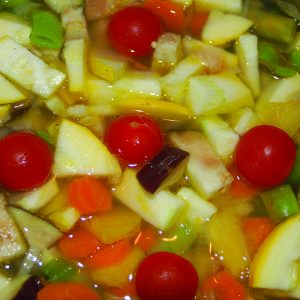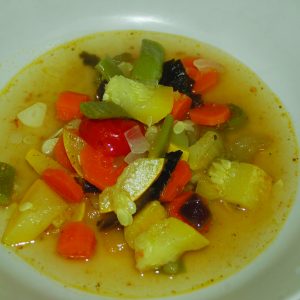Saturday 20 of February 2021
Our goal is to become self sufficient with our food. We need five years to achieve this. We will reach this goal in five steps. In the first year, we worked the land, clearing it and creating a fine tilth, removing the stones and weeds. At the same time, we composted, then used compost as a fertilizer for the first sowing in the second year: potatoes and onions, peas and beans, tomatoes and peppers and many more things. We also would recommend a permaculture course at Quinta Vale da Lama in Lagos. For today’s recipe, almost all of the ingredients are from our own garden. This fourth year’s harvest was: green beans, broccoli, tomatoes, onions, potatoes and sweet potatoes, garlic and bay leaves. It’s a recipe for a winter day.
We also have strawberries planted in aquaponics cork boards in a 5m by 2m tank which is where we are also experimenting with growing herbs. Aquaponics has the advantage of doing away with watering, as plants grow directly in the water.

So let’s start preparing lunch. We can use lentils from Spain from the organic shop, or grain bought from the market produced by one of the village farmers, as well during lock down of Covid-19. We don’t have grain from our own garden yet, but we might already have it next year. Almost all over the country there are markets where local produce is sold. They deserve our support, so that’s where we shop once a week: we buy honey, corn and cured olives to make olive paté, a wonderful spread for bread. For the pâté, remove the pits from the olives that have been marinated in garlic, lemon and oregano. Mix with a hand blender until creamy and add a little olive oil, oregano and salt to taste. Now it’s ready.
In November, we harvested the olives. At the oil press out of the cold, we still got five litres of olive oil from about 50 kg of olives. This oil is now coming to an end. But at Padieiros, Alferce, we can buy precious, golden olive oil for six euros a litre. And they fill up the glass bottle which we take along for this purpose. The taste is wonderful. But let’s enjoy our own table olives.
As for the large quantity of tomatoes that the garden gave us, we made a sauce with them, which is prepared on a low heat and used for pasta, bringing back memories of summer for us during winter meals. We don’t follow a vegan diet, but we don’t eat meat anymore. What is not consumed in summer is traditionally preserved for the winter. We’ve even had several harvests of potatoes. On the weekends I go to fetch some goat’s milk from my neighbour Jose. Antonio or Eric have eggs on Fridays. Sometimes we buy a goat’s cheese from Peregrina or Monique. Right now we are eating dry figs, walnuts and almonds.

But now let’s make lunch: saute three medium sized onions in olive oil and season with Tavira salt and red pepper from the garden. For four people, use one litre of water and one vegan stock cube (no palm oil please!). The onions are sauteed very slowly until brown. Then add the water, two bay leaves, the beans, the broccoli, a little later the tomatoes preserved last summer and the potatoes could also be sweet potatoes. And if there is still something else to enjoy in the kitchen, it’s to be added now, for example: sweet pepper, courgette or carrot cut into small dice, as well winter cabbadge and pumpkin. Finally, be sure to add the previously washed lentils or the grain, which has to be left overnight to soak in water.
Let this colourful variety of ingredients simmer for 45 minutes. If necessary, add more water. Check the seasoning, remove the bay leaves, and then add some more oregano and olive oil. Just before turning off the heat, add a chopped chilli, stirring well. This is the last touch for this stone soup.
Let’s come to the dessert, a gluten-free cake. We in Monchique, lockdown or not, always keep old family recipes to bake cakes. One of them is called BOLO DE TACHO. What is special about it? If you know the traditional recipe, write us what ingredients you use and how you bake the little round cake. The first ten readers will win ten shopping vouchers worth ten euros each at Mercearia Bio in Portimão. Enjoy your food!
Enjoy your food!
 Eco123 Revista da Economia e Ecologia
Eco123 Revista da Economia e Ecologia









